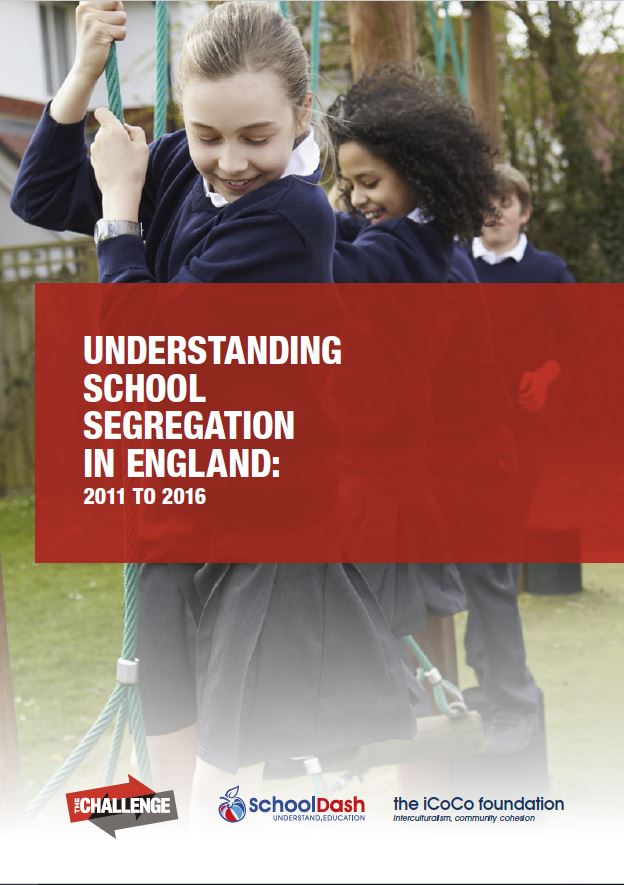 ‘Faith’ schools in England are ‘more ethnically segregated than schools of no faith’ and ‘more likely to cater to more advantaged students’, new research has revealed.
‘Faith’ schools in England are ‘more ethnically segregated than schools of no faith’ and ‘more likely to cater to more advantaged students’, new research has revealed.
The report, entitled Understanding School Segregation in England: 2011 to 2016, examines the level of segregation within schools by comparing the ethnic make-up and free school meal eligibility of their intake to those of the ten schools closest to them, finding that ‘faith’ schools are significantly more segregated along both ethnic and socio-economic lines than other types of school.
It was published by social integration charity, The Challenge, education data analytics company, SchoolDash, and the iCoCo (Institute of Community Cohesion) Foundation, which along with the British Humanist Association (BHA) is a co-founder of the Fair Admissions Campaign.
The report’s key findings in relation to ‘faith’ schools are as follows:
- ‘Faith schools at primary are more ethnically segregated than schools of no faith (28.8% of faith schools compared with 24.5% of those of no faith) when compared with neighbouring schools. This is particularly pronounced for Roman Catholic schools’.
- ‘At primary level, faith schools are more likely to cater to more advantaged students, with 4.4% of faith schools having a high FSM intake compared with nearby schools, versus 11.4% for non-faith. This is particularly pronounced for Roman Catholic schools (of which 38.3% have a low FSM intake, versus 17.1% of non-faith)… The relationship at secondary level is similar but not as strong, with 23.8% of Catholic schools having a low FSM intake, compared with 17.2% of non-faith schools.’
- ‘The collective impact of faith schools, particularly the predominant Catholic and Church of England schools which are by far the most numerous, needs to be examined. As an example, in one London Borough the 17 faith primary schools that have somewhat diverse intakes, take between one and five times the proportion of White British [pupils] compared to the area and this substantially reduces the potential for other schools to become more mixed.’
The report also details the extensive research of the Fair Admissions Campaign, co-founded by the BHA, which previously found that ‘faith schools admitted fewer children eligible for free school meals than lived locally to them’.
Reacting to the report, BHA Education Campaigner Jay Harman commented, ‘Once again, the evidence is unequivocal. “Faith” schools are not a positive feature of a diverse and integrated society, as is so often claimed. Rather, they are a barrier to integration and a barrier to the promotion of mutual understanding and respect between people from different religious, ethnic, and socio-economic backgrounds.
‘Despite this, the Department for Education seems determined not only to increase the number of “faith” schools in England, but also to give them greater freedoms to discriminate against and segregate pupils. This is a disastrous, evidence-defying approach to boosting social mobility and integration, and betrays the fact that this Government is more interested in bowing to the demands of the religious lobby than it is in standing up for the better interests of children and society. It must heed the recommendations of this report and reconsider the place of religious schools in our education system.’
Notes
For further comment or information please contact the BHA’s Education Campaigns Manager Jay Harman on jay@humanists.uk or 0207 324 3078.
Read the full report (embargoed for Wednesday 22 March): https://drive.google.com/file/d/0BxL3m2uvdxMea2F1X0liT2JMSG5kYjJKaVN1akpSWjBLSEh3/view
Read the BHA’s previous news item ‘Faith schools three times more socially selective than others, new research finds (again)’: https://humanists.uk/2017/03/01/faith-schools-three-times-more-socially-selective-than-others-new-research-finds-again/
Read the BHA’s news item ‘Government publishes plans to allow full religious discrimination in school admissions’: https://humanists.uk/2016/09/13/government-publishes-plans-to-allow-full-religious-discrimination-in-school-admissions/
Read the previous BHA story, ‘“The evidence shows this to be the very opposite of integration”: Humanists publish response to “faith” school admissions consultation’: https://humanists.uk/2016/12/12/the-evidence-shows-this-to-be-the-very-opposite-of-integration-humanists-publish-response-to-faith-school-admissions-consultation/
Read more about the BHA’s work on ‘faith’ schools: https://humanists.uk/campaigns/schools-and-education/faith-schools/
The British Humanist Association is the national charity working on behalf of non-religious people who seek to live ethical and fulfilling lives on the basis of reason and humanity. It promotes a secular state and equal treatment in law and policy of everyone, regardless of religion or belief.
The BHA is a co-founder of the Fair Admissions Campaign (FAC). The FAC wants all state-funded schools in England and Wales to be open equally to all children, without regard to religion or belief. The Campaign is supported by a wide coalition of individuals and national and local organisations. We hold diverse views on whether or not the state should fund faith schools. But we all believe that faith-based discrimination in access to schools that are funded by the taxpayer is wrong in principle and a cause of religious, ethnic, and socio-economic segregation, all of which are harmful to community cohesion. It is time it stopped.
Supporters of the campaign include the British Humanist Association, Professor Ted Cantle and the iCoCo Foundation, the Association of Teachers and Lecturers, British Muslims for Secular Democracy, the Campaign for State Education, the Centre for Studies on Inclusive Education, the Christian think tank Ekklesia, the Hindu Academy, the Green Party, the Liberal Democrat Education Association, Liberal Youth, the Local Schools Network, Richmond Inclusive Schools Campaign, the Trust, the Socialist Educational Association, and the General Assembly of Unitarian and Free Christian Churches.
